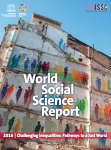Increased inequalities could jeopardize the sustainability of economies, societies and communities if not checked, and undermine efforts to realize the Sustainable Development Goals (SDGs) by 2030, finds a report published by the UN Educational, Scientific and Cultural Organization (UNESCO) and the International Social Science Council (ISSC).
At the same time, many parts of the world have critical gaps in data on inequalities.
UNESCO Director-General Irina Bokova said that increasing social science research on inequalities is critical to achieving the 2030 Agenda for Sustainable Development.
 22 September 2016: Increased inequalities could jeopardize the sustainability of economies, societies and communities if not checked, and undermine efforts to realize the Sustainable Development Goals (SDGs) by 2030, finds a report published by the UN Educational, Scientific and Cultural Organization (UNESCO) and the International Social Science Council (ISSC). At the same time, many parts of the world have critical gaps in data on inequalities. UNESCO Director-General Irina Bokova said that increasing social science research on inequalities is critical to achieving the 2030 Agenda for Sustainable Development.
22 September 2016: Increased inequalities could jeopardize the sustainability of economies, societies and communities if not checked, and undermine efforts to realize the Sustainable Development Goals (SDGs) by 2030, finds a report published by the UN Educational, Scientific and Cultural Organization (UNESCO) and the International Social Science Council (ISSC). At the same time, many parts of the world have critical gaps in data on inequalities. UNESCO Director-General Irina Bokova said that increasing social science research on inequalities is critical to achieving the 2030 Agenda for Sustainable Development.
The report, titled ‘World Science Report 2016 – Challenging Inequalities: Pathways to a Just World,’ highlights gaps in social science data on inequalities in different parts of the world. It explains that reducing inequality helps eradicate poverty, foster sustainability, promote civil progress, reduce conflict and violence, and develop inclusive governance. The report urges more robust research regarding the links between economic inequalities and areas such as gender, education and health.
The study finds that there was a five-fold increase in inequality and social justice studies from 1992 to 2013, but many focused on quantifiable indicators, and did not consider inequalities that go beyond income and wealth, such as health, education and gender, or the multiple consequences of inequality. The report explains that social science research tends to focus on inequalities in developed countries where reliable data exists, such as North America and Western Europe, which accounted for more than 80% of social and human science publications on inequalities and social justice from 1992 to 2013. In contrast, Sub-Saharan Africa and Latin America contributed 3% and 2%, respectively.
The report identifies seven intersecting dimensions of inequality (economic, political, social, cultural, environmental, spatial and knowledge-based), and calls to: move beyond economic inequality, looking at interactions among the multiple dimensions of inequality; document inequality trends in all regions of the world; provide data and information on less well-researched countries, specifically in Africa and Asia; analyze the consequences of inequalities in different countries and regions and for different people; identify strategies to reduce inequalities; and propose a global research agenda on inequality, based on knowledge gaps. [UNESCO Press Release] [Publication: World Science Report 2016 – Challenging Inequalities: Pathways to a Just World]